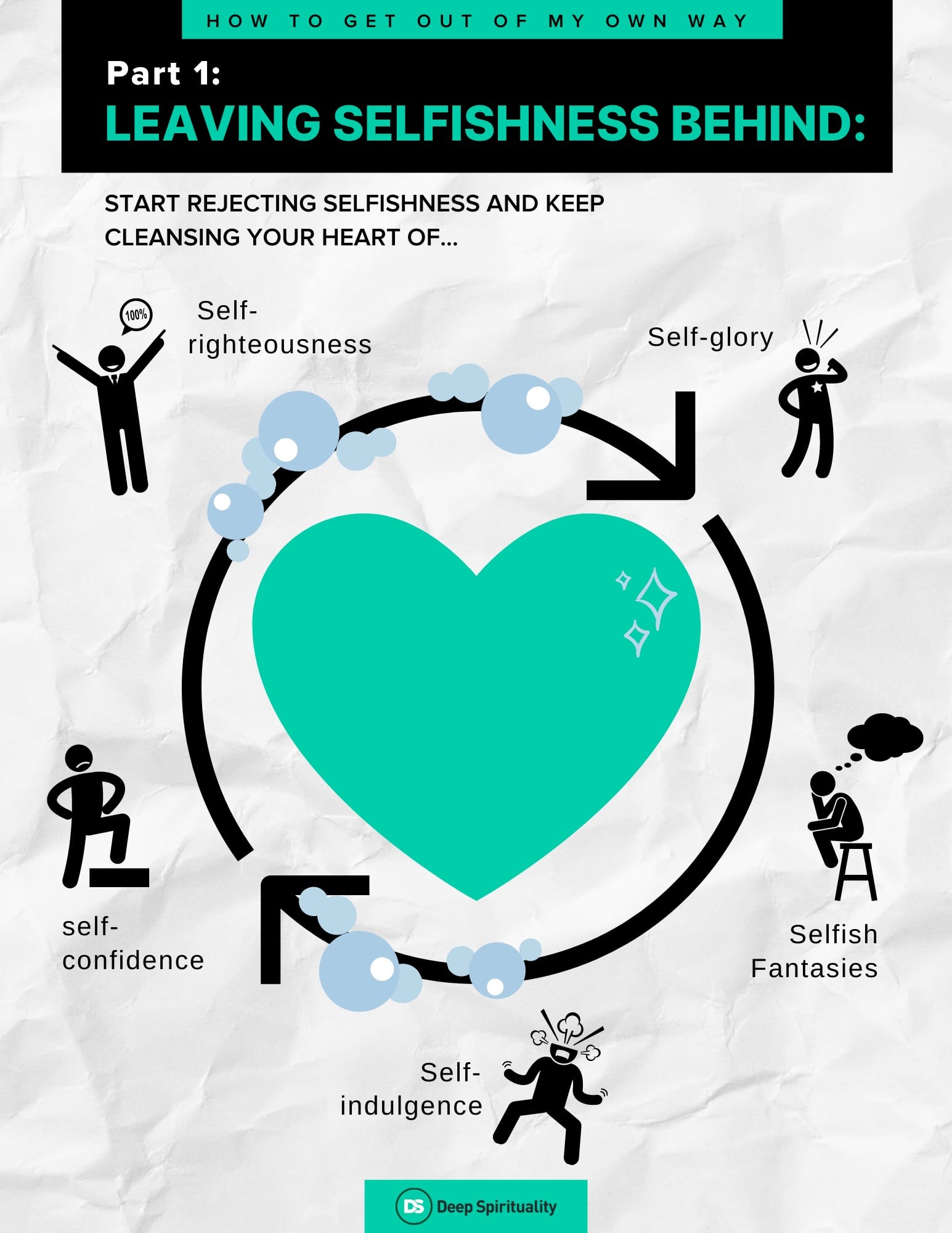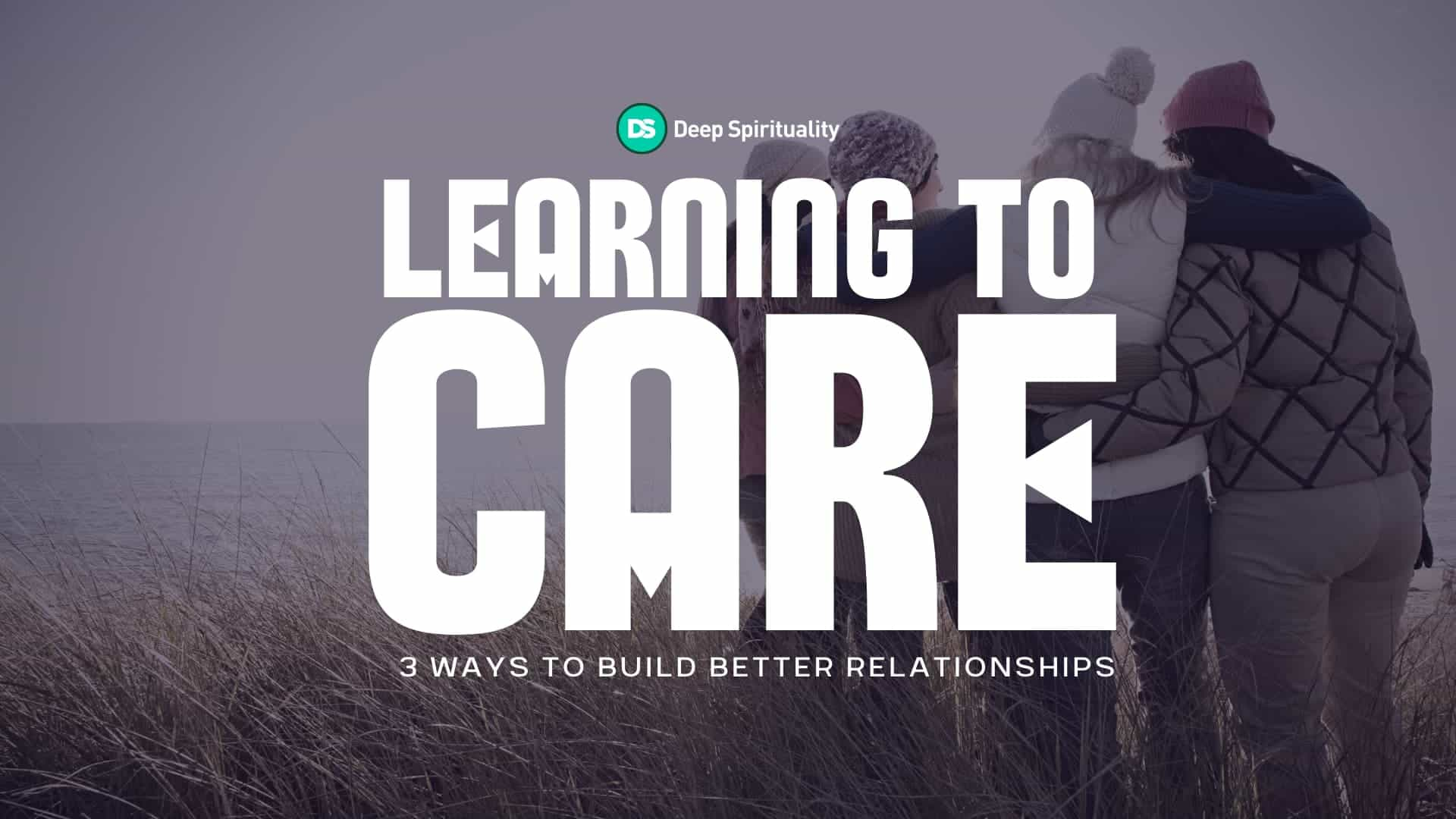When I started reading the Bible for the first time, I came across a scripture in which Jesus taught that God cared so deeply about me that he could count every hair on my head (Matthew 10:30).
I’ll never forget that moment. I had lived my whole life feeling inadequate and invisible, and in that moment I learned that I mattered.
God’s intimate care and love for me began to change me from the inside out. I became nicer. I apologized to people I had wronged. I said hi to people instead of keeping to myself.

For the first time, I could see past my own insecurities and fears of rejection to genuinely care about other people.
My experience is not unique. The Bible tells us Jesus came into this world to bring us the good news of forgiveness, freedom, healing, and the favor of God:
The Spirit of the Lord is on me, because he has anointed me to proclaim good news to the poor. He has sent me to proclaim freedom for the prisoners and recovery of sight for the blind, to set the oppressed free, to proclaim the year of the Lord’s favor.
Luke 4:18-19 NIV
Jesus lived his life selflessly, bringing hope to the world around him and to each of us.
The love and care he showed to people around him when he physically walked the earth healed their pain and changed their lives. He also showed them —and us— how loving and kind God is (John 1:18).
Those who followed Jesus’ selfless example in the centuries to come continued to show the world God’s character. Early Christians were known as people who took care of each other and made the world a better place. They built institutions to make healthcare and education accessible. They revolutionized the way the world treated the poor, the oppressed, and the hurting.
Those of us who follow Jesus’ example today can make the same kind of impact on the often divided world around us. In fact, Jesus actually promised that we can do even greater things than he did (John 14:12).
How? By getting out of our own way.
I have been crucified with Christ, and I no longer live, but Christ lives in me. The life I now live in the body, I live by faith in the Son of God, who loved me and gave himself for me.
Galatians 2:20 CSB
Galatians 2:20 teaches us that living by faith in the Son of God means “you” no longer live – but Jesus lives in you. So if you want to have a close relationship with God and other people, you’ll need to learn to leave yourself behind.
To be selfish is to be concerned excessively or exclusively with oneself. Selfishness is one of the biggest obstacles to having the kind of close relationship with God and inspiring relationships with other people that many of us desire.
In this study, we’ll look at 15 secrets to leaving selfishness behind so we can build or rebuild our relationship with God and other people.
Leaving selfishness behind is quite a task, so we split this study into two parts. In part 1, we’ll learn how to leave selfishness (and its many other “self-” cousins) behind. In part 2, we’ll focus on rebuilding our relationship with God and others by developing the powerful spiritual quality of self-control.
Part 1: Leaving Selfishness Behind
Selfishness can be sneaky. It comes in many forms —from self-indulgence to self-pity to self-righteousness. It’s a sin that is easy to tolerate, because it may not seem as scandalous or embarrassing as other sins.
It’s also a sin that is very easy to turn to in the midst of a scary and stressful global pandemic. Living with constant fear for our physical or financial well-being will naturally make us want to hunker down and protect ourselves and our families from potential harm.
But selfishness doesn’t bring the protection or satisfaction it promises. It’s actually a major hindrance to our faith, our relationship with God, and our relationships with other people.
Sometimes, counterintuitively, the more we try to protect ourselves from harm, rejection, or perceived danger, the more we actually suffer.
We suffer from insecurity because we constantly wonder what people think of us. We suffer from mistrust, as we try to protect ourselves from potential hurt from other people.
Selfishness can also make us stressed, as we rely on our own strength to do things only God can do.
Jesus died to free us from this self-consumed, self-protective life:
…and He died for all, so that all those who live would no longer live for themselves, but for Him who died and was raised for their sake.
2 Corinthians 5:15 (AMP)
When we truly believe Jesus loved us and gave up his life for us, we won’t need or want to live for ourselves anymore. We’ll be able to build a close relationship with God and with other people, instead of living a self-consumed life.
So let’s get started by looking at 7 ways to leave selfishness behind.

Start rejecting selfishness
I will reject all selfishness and stay away from every evil.
Psalm 101:4 (TLB)
The Bible calls us to reject all selfishness. If you’ve ever been rejected from something (a college application, a sports team, or a loan, for example) you know that “rejection” means actively saying no to something.
Rejection is not passive. It only happens if we decide to do it. We can only “reject all selfishness” if we recognize it in our lives and start saying “no” to it.
So what are the “self-” sins we need to make sure we reject? Author A.W. Tozer gives us a helpful list in his book The Pursuit of God: The Human Thirst for the Divine:
To be specific, the self-sins are these: self-righteousness, self-pity, self-confidence, self-sufficiency, self-admiration, self-love and a host of others like them.
“The grosser manifestations of these self-sins . . . egotism, exhibitionism (attracting attention to oneself), self-promotion, are strangely tolerated in Christian leaders,”
A.W. Tozer, The Pursuit of God: The Human Thirst for the Divine
Before moving forward in this study, stop and ask yourself how much you tolerate “self-” sins.
Do you look for and admit selfishness in your heart? If you don’t, your relationship with God will suffer and your impact on the people around you won’t be what you want.
People see what we do, not necessarily what we say. If our lives are full of “self-” sins like self-consumption, self-pity, or selfish ambition, people around us won’t feel loved even if we try to say nice or religious words.
As the poet Ralph Waldo Emerson once said, “Your actions speak so loud, I can’t hear what you say.”

Pause and reflect
- Do you reject selfish sins, or do you tend to excuse and accept selfishness in your life?
Keep on cleansing your heart
Keep cleansing me, God, and keep me from my secret, selfish sins; may they never rule over me! For only then will I be free from fault and remain innocent of rebellion.
Psalm 19:13 (TPT)
Continual cleansing is something many of us have gotten used to over the course of the coronavirus pandemic. We know that we need to continually cleanse our hands and shared surfaces to protect ourselves from this invisible little enemy germ.
Likewise, the Bible tells us we need to keep asking God to cleanse us from our secret, selfish sins. Like invisible germs, selfish sins can hide in our hearts and cause lots of problems in our relationships.
One of the ways we can cleanse the self-sins out of our hearts is through vulnerable and honest prayer. Sometimes, unresolved emotions can make us selfish. For example, if we’re afraid of failure or rejection, we might turn to selfish ambition or self-reliance to handle our unresolved fear.
Trying to tell yourself not to be selfish probably won’t work for very long. In the words of A.W. Tozer, “self” can only be removed by spiritual experience:
Self is the opaque veil that hides the face of God from us. It can be removed only in spiritual experience, never by mere instruction. We may as well try to instruct leprosy out of our system. There must be a work of God in destruction before we are free.
The Pursuit of God, (43-44)
Instead, like David in Psalm 19, we can humbly ask God for help cleansing our hearts. God can clean selfishness out of our hearts, if we ask him.
Let’s look at a few more scriptures to help us identify the sneaky selfish sins that might be hiding in our hearts and leave them behind us.
Leave self-glory behind
“I said to the arrogant, ‘Do not boast;’ And to the wicked, ‘Do not lift up the horn [of self-glorification].
Psalm 75:4 (AMP)
One of the ways selfishness comes out in our lives is self-glorification, which can be defined as personal vanity or pride. Not convinced you have this in your life?
Check out some synonyms for self-glory from Merriam-Webster:
bighead, complacence, complacency, conceit, conceitedness, ego, egotism, pomposity, pompousness, pride, pridefulness, self-admiration, self-assumption, self-conceit, self-congratulation, self-esteem, self-importance, self-love, self-opinion, self-satisfaction, smugness, swelled head, swellheadedness, vaingloriousness, vainglory, vainness, vanity
Merriam-Webster
Self-glorification leaves no room for God in our lives because everything we do is about proving how great and good we are. Also, as you read through the list of synonyms for self-glorification, it’s not hard to see why this sin hurts our relationships.
Do you enjoy hanging out with someone who is full of egotism, self-conceit, self-love, and vanity? Probably not.
But the antonyms for self-glorification are: humbleness, humility, and modesty. So we can leave this self-sin behind by humbly giving God more credit than we take for ourselves.
Incline my heart to your testimonies, and not to selfish gain!
Psalm 119:36 (ESV)
As this scripture says, we can ask God to incline our hearts more to his word than our own selfish gain of attention, pride, or admiration.
Pause and reflect
- How much does self-glorification motivate you to do the things you do at work, school, or in relationships?
- How different do you think your relationship with God and other people would be if you left self-glorification behind?
Leave self-righteousness behind
O love the LORD, all you His godly ones! The LORD preserves the faithful [those with moral and spiritual integrity] And fully repays the [self-righteousness of the] arrogant.
Psalm 31:23 (AMP)
To be self-righteous is to be convinced of one’s own righteousness especially in contrast with the actions and beliefs of others.
Self-righteousness hurts our relationship with God because it makes us think we don’t need him. That’s why Psalm 31:23 says that arrogant people tend to be self-righteous; when we rely on our own good deeds and actions to be “right” with God, we’ll wind up full of ourselves with little room for faith in God.
Self-righteousness hurts our relationships too because it makes us constantly compare ourselves with or criticize other people. Instead of empathizing with other people’s weaknesses because we are aware of our own, we look down on them.
The truth, of course, is that no one is perfect and our good deeds can never earn us salvation (Ephesians 2:8). So one way we can leave self-righteousness behind is by being real about our own mistakes and shortcomings and our need for God’s forgiveness.
Being real about who we are helps us be grateful for God instead of taking him for granted. And that gratitude for God’s goodness and mercy should motivate us to want to share God’s mercy with others.
Pause and reflect
- Do you tend to rely on your own good deeds to be “righteous”?
- Are there any relationships in which you tend to be critical or frustrated by other people’s shortcomings?
- How do you think your relationship with God and others would be different if you left self-righteousness behind?
Leave selfish fantasies behind
So I lifted my grace from off of their lives and I surrendered them to the stubbornness of their hearts. For they were living according to their own selfish fantasies.
Psalm 81:12 (TPT)
A “fantasy” is an idea with no basis in reality. Sometimes, instead of having faith in God, we fill our minds with fantasies about ourselves.
Need more clarity? Let’s look at some of the synonyms for fantasy:
- Daydream
- Delusion
- Dream
- Figment, illusion
- Pipe dream
- Unreality
How much of your mind is full of daydreams and illusions of things you could get for yourself? This might include physical things or other forms of self-gratification like praise, achievement, or pleasure.
On the other hand, sometimes the things we dream about are actually good things, but fantasizing about them is not the same as taking faithful action to make them happen.
God wants us to live by faith (Hebrews 10:38), not selfish fantasies about our own lives. Living by faith means believing God is real and wants to bless our lives, and that he has chosen us for a great purpose to make a difference in the world.
When we believe that, our faith will motivate us to take selfless action instead of living according to selfish fantasies.
Pause and reflect
- Would you say you live more by selfish fantasy or by faith in God?
Leave self-indulgence behind
A [closed-minded] fool does not delight in understanding, But only in revealing his personal opinions [unwittingly displaying his self-indulgence and his stupidity].
Proverbs 18:2 (AMP)
When I think of self-indulgence, I often first think of physical things like overeating a decadent chocolate cake or lounging around at the spa.
But this scripture paints a slightly different picture of self-indulgence. Sometimes self-indulgence means being more interested in our own opinions than we are in understanding other people or understanding God’s Word.
This is emotional self-indulgence, and it can create a lot of distance in our relationships.
Have you ever tried to be close to someone who has no interest in listening to what you have to say? It can be a frustrating experience, and that is how we treat God and other people around us when we’re full of self-indulgence about our opinions and emotions.
Emotional self-indulgence makes us believe our own opinions and thoughts more than Scripture, leaving God and spiritual friends unable to be close to us.
Pause and reflect
- Do you tend to be open minded to hearing and understanding other people’s thoughts and opinions? Or is it hard to change your mind?
- How do you think being “self-indulgent” in your opinions affects your relationship with God and other people around you?
Leave self-confidence behind
Self-confidence isn’t usually something we think of as “bad” like self-indulgence or self-glorification, but relying on ourselves and our abilities to find confidence actually is a form of “selfishness.”
The apostle Paul wrote about leaving self-confidence behind to build a more intimate relationship with God in the book of Philippians:
For it is we who are the circumcision, we who serve God by his Spirit, who boast in Christ Jesus, and who put no confidence in the flesh— [4] though I myself have reasons for such confidence. If someone else thinks they have reasons to put confidence in the flesh, I have more:
[5] circumcised on the eighth day, of the people of Israel, of the tribe of Benjamin, a Hebrew of Hebrews; in regard to the law, a Pharisee; [6] as for zeal, persecuting the church; as for righteousness based on the law, faultless. [7] But whatever were gains to me I now consider loss for the sake of Christ. [8] What is more, I consider everything a loss because of the surpassing worth of knowing Christ Jesus my Lord, for whose sake I have lost all things.I consider them garbage, that I may gain Christ [9] and be found in him, not having a righteousness of my own that comes from the law, but that which is through faith in Christ—the righteousness that comes from God on the basis of faith.
Philippians 3:3-9 NIV
Here, Paul explains that he could have chosen to put his confidence in physical qualities about himself, but instead he considers those things garbage. What he is describing here is that he had to leave himself behind to get closer to God.
Clinging to his religious behavior and his accolades would have actually hurt his relationship with God. Leaving his self-confidence behind gave him room to get to know God better and to live by faith in God instead of faith in himself.
Pause and reflect
- What do you rely on to feel confident? Do you see any areas of “self-confidence” in your life?
- How do you think “self-confidence” affects your relationship with God?
Part 2: Rebuilding Our Relationship With God and People By Developing Self-Control
Now that we’ve identified some common forms of selfishness that can hide in our hearts, let’s look at how we can strengthen our relationship with God and other people by developing self-control.
The kind of self-control we are talking about in this article is more than just denying yourself a cookie when you really want it. Self-control is a spiritual quality, something that God’s Spirit produces in our lives:
But the Holy Spirit produces this kind of fruit in our lives: love, joy, peace, patience, kindness, goodness, faithfulness, [23] gentleness, and self-control. There is no law against these things!
Galatians 5:22-23 NLT
The kind of self-control this scripture talks about is connected with our emotions. Love, joy, peace, and patience, kindness, goodness, and gentleness are things I would really like to experience on a daily basis. But I often overlook that final fruit of God’s Spirit that is just as important: self-control.
Self-control gives us the power to say “no” to our doubts and fears. Self-control gives us the courage to forgive people who hurt us. Self-control empowers us to believe God’s promises more than our emotions. Self-control helps us fight our temptation to quit when life gets hard.
Self-control is powerful. Learning to conquer selfishness requires not just trying to “stop being selfish,” but developing something stronger in its place.
So let’s finish off our list of 15 secrets to leaving selfishness behind with 8 ways to develop spiritual self-control.
Recognize your need for self-control
They get lost and die because of their foolishness and lack of self-control.
Proverbs 5:23 (CEV)
One of the ways we can develop self-control is learning to hate what happens without it. Lacking self-control can lead us down some bad paths.
When we lack self-control, we make foolish decisions. This could be something as small as staying up too late watching TV because we are running from negative feelings, and suffering from physical and emotional exhaustion the next day. Or it could be something bigger, like losing our faith in God because we’re letting negative emotions run our life.
Recognizing our need for self-control is an important part of developing it. Take time to reflect on how self-control (or your lack of it) has affected your relationship with God and other people.

Pause and reflect
- How do you think your relationship with God and others could be closer, happier, and stronger if you developed more self control?
Learn how to handle an insult
The [arrogant] fool’s anger is quickly known [because he lacks self-control and common sense], But a prudent man ignores an insult.
Proverbs 12:16 (AMP)
One sign that we lack self control is being quick to get angry. Perhaps the Bible tells us to learn to ignore insults because things that make us feel “insulted” happen all the time in life.
Insults (often unintentional) are common in relationships. Someone forgot to invite you to a hangout time, or your teenager blatantly insults you when you won’t give them what they want.
Relationships are difficult with anyone – a friend, a spouse, or a kid – if you lack self-control. Only with God’s help can we develop true spiritual self-control, and some relationships show us just how much we really need God’s help.
Emotional self-control gives us the ability to handle these painful interactions with other people with understanding and common sense.
We should note here that self-control and ignoring insults is not the same as denying or hiding our feelings. Spiritual self-control means we take the time to humbly process our feelings in prayer, understand where the other person is coming from, and find the spiritual strength to forgive or overlook wrongs, instead of quickly jumping to anger.
Pause and reflect
- How do you handle feeling insulted?
- In what relationships do you tend to get angry quickly? What do you think God could be teaching you through these relationships?
Let the Scriptures teach you to be self-controlled
These are the wise words of Solomon son of David, king of Israel. [2] They teach wisdom and self-control; they will help you understand wise words. [3] They will teach you how to be wise and self-controlled and will teach you to do what is honest and fair and right.
Proverbs 1:1-3 (NCV)
The Scriptures are full of wisdom and can teach us how to handle life and relationships.
One night several years ago I had a brief conversation with a friend that hurt my feelings. I felt very insecure about a comment she made about how I was acting in a group setting. As I walked away and tried to process what she said, my emotions felt overwhelming.
I was soon overpowered by my anger, embarrassment, and insecurity. I tried talking to my husband but nothing he said could resolve my feelings.
Finally, I decided to look at a scripture. I came across this verse about pride and humility:
Pride leads to disgrace, but with humility comes wisdom.
Proverbs 11:2 NLT
Immediately my defenses melted away as I realized that my pride was making me overreact in disgrace to something that was not intended to hurt me. The Bible gave me wisdom about why I was acting the way I was and made me wish I had opened the Bible earlier, because it could have saved me a lot of emotional negativity.
The Scriptures give us wisdom and teach us to be self-controlled. I think God knows it’s hard for us to muster up emotional self-control on our own, so he gave us his powerful Word to calm our hearts and teach us to do what’s right.
Pause and reflect
- Do you let the Scriptures teach you to be wise and emotionally self-controlled?
- When you’re upset, do you let God teach you through Scripture what’s happening to your heart and why you’re reacting the way you are?
Replace “self” with God
The [reverent] fear of the LORD [that is, worshiping Him and regarding Him as truly awesome] is the beginning and the preeminent part of knowledge [its starting point and its essence]; But arrogant fools despise [skillful and godly] wisdom and instruction and self-discipline.
Proverbs 1:7 (AMP)
The more time we spend learning about who God is, what he thinks, and what he is capable of doing, the less time we’ll spend thinking about ourselves. But when we lack self-discipline, we would rather spend our time on whatever feels good than work on our relationship with God.
How much effort do you put into learning about God through reading Scriptures and prayer? Worshiping God and “regarding him as truly awesome” is the beginning of knowledge, according to Proverbs 1:7. And, as we’ll see in the next scripture, spiritual wisdom helps us have a “cool spirit” and even temper.
Let God give you a ‘cool spirit’
He who has knowledge restrains and is careful with his words, And a man of understanding and wisdom has a cool spirit (self-control, an even temper).
Proverbs 17:27 (AMP)
This is a challenging verse to read, because I do not have a “cool spirit” or an even temper. But the good news is that God can help me develop these qualities.
Self-control enables us to have a “cool spirit” and even temper. Do you have an even temper in your relationships with your family, spouse, or roommates? Having an even temper would certainly improve the quality of many of my relationships, because anger causes me to distance myself from people and say things I later regret.
The way the Bible tells us to get this “cool spirit” is through knowledge, understanding, and wisdom. I don’t think this scripture is referring necessarily to intellectual knowledge, but rather to emotional and spiritual wisdom such as:
- Knowledge of God – what does God think about this situation I am in? How does he feel about the choices I am making or how I am responding to someone in my life? How is God moving for my good in this situation?
- Understanding of my heart – why am I reacting the way I am? What’s happening in my heart right now?
- Wisdom from the Bible about my relationships – What might this other person be feeling or going through that is making them act this way? What does the Bible say about what’s happening in our relationship?
Pause and reflect
- How do you think knowledge, wisdom, and understanding would help you have a “cool spirit” in your relationships?
Learn to like the truth
Learn the truth and never reject it. Get wisdom, self-control, and understanding.
Proverbs 23:23 (NCV)
Why does the Bible tell us to “never reject” truth? Perhaps because truth is easy to reject. Often, we employ self-sins when we don’t want to deal with difficult truths.
Self-righteousness is a way of denying the truth about our guilt and mistakes. Self-confidence is a way of denying the truth about our limitations. Self-indulgence is a way of rejecting the truth of God’s Word and living by our emotions.
Learning to like the truth can actually help us develop self-control. When we are truthful about ourselves, we don’t get overly emotional about our weaknesses.
We accept the truth that we need God’s help and forgiveness and presence in our lives. And then we can move on past ourselves to think about helping other people.
Pause and reflect
- How do you tend to respond to truth?
- Do you reject truth, avoid truth, or embrace truth about yourself and about God?
Choose self-control over quitting
Like a city that is broken down and without walls [leaving it unprotected] Is a man who has no self-control over his spirit [and sets himself up for trouble].
Proverbs 25:28 (AMP)
Self-control protects us in times of trouble. When we lack self-control, it’s like the “walls” of our city are broken down and open to invaders. We’ll be vulnerable to spiritual attacks and temptations to quit or give in to our negative emotions.
Self-control enables us to say “no” to giving in to discouragement and feelings of failure because usually these feelings are focused on ourselves and not on how God is moving for our good and training us.
Recognizing that we’re giving in to our “selves” can actually help protect us against the temptation to quit or give up in the battles we face in our lives.
Pause and reflect
- What battles are you fighting in your life or faith right now?
- Have you felt any desires to quit? How do you think these temptations to quit might be related to a greater need for self-control?
Take an interest in someone else
Don’t be selfish; don’t try to impress others. Be humble, thinking of others as better than yourselves. [4] Don’t look out only for your own interests, but take an interest in others, too.
Philippians 2:3-4 NLT
This might sound overly simple, but perhaps one of the biggest ways we can develop self-control is by practicing thinking of others more than ourselves. Taking an interest in someone else will leave little room for yourself.
As famous author CS Lewis said,
Humility is not thinking less of yourself, it’s thinking of yourself less.
CS Lewis
Once I had a friend give me a wise piece of advice: carry a pack of blank greeting cards with you, and when you have a free moment try writing a nice card for someone.
Instead of letting my thoughts go inward and self-focused during my downtime, I started taking short moments to encourage others. This piece of advice made me instantly happier because it helped me not focus on myself.
Pause and reflect
- Who are some people you think God wants you to take more of an interest in? Your spouse? Your child? A coworker or family member?
Leaving selfishness behind takes some spiritual work, but it’s worth it.
Our relationships with God and other people will be stronger, closer, and more inspiring when we learn to develop spiritual self-control instead of giving in to ourselves.





